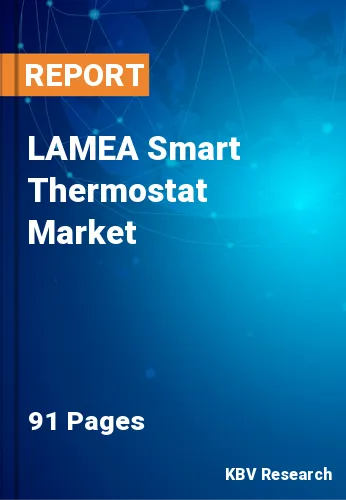The Latin America, Middle East and Africa Smart Thermostat Market would witness market growth of 20.9% CAGR during the forecast period (2022-2028).
Smart thermostats have several sensors. In an attempt to mitigate the issues with human errors involved with programmable thermostats, the smart thermostat uses sensors that can determine occupancy patterns to change the temperature automatically based on the occupant's behavior and patterns. The Nest learning thermostat, in particular, utilizes passive infrared (PIR) motion sensors inside the unit to sense occupancy in the vicinity of the thermostat.
These sensors are also utilized to determine the occupancy patterns to create the auto schedule. A grille member is placed in front of the sensor to protect and conceal the PIR motion inside the thermostat visually. The grille also aids to make the thermostat visually pleasing. While this sensor, technology is essential for conserving energy, it is not without flaws.
The programmable schedule feature of the smart thermostat is same to that on the standard programmable thermostats. Options are given to users to program a custom schedule to decrease the energy consumption when the users are away from home. It has been witnessed that manually creating a schedule may lead to more energy consumption than just keeping it at a set temperature. To avoid this problem, smart thermostats come with an auto-schedule feature.
Travelers now favor visiting Dubai more than any other place. Several well-known buildings in the area, including Burj Al Arab and Burj Khalifa, draw tourists to the site. In addition, Dubai has a wide presence of luxury when it comes to modern home designs or interiors decorated with marble and gold. The area is home to many lavish hotels, expensive restaurants, and upscale spas. The travel and tourism industry directly contributed AED 68.5 billion (USD 18.7 billion), or 5.2% of the UAE's GDP, to the country's GDP in 2016. From 2017 to 2027, it is anticipated to increase by 5.1% per year, reaching AED 116.1 billion (USD 31.6 billion), or 5.4% of the country's GDP. The LAMEA region's growing tourism and hospitality industry, which is producing more hotels, spas, and resorts, is also providing growth potential for the market for smart appliances such as smart thermostats.
The Brazil market dominated the LAMEA Smart Thermostat Market by Country in 2021, and would continue to be a dominant market till 2028; thereby, achieving a market value of $146.9 million by 2028.The Argentina market is exhibiting a CAGR of 21.5% during (2022 - 2028). Additionally, The UAE market would showcase a CAGR of 20.6% during (2022 - 2028).
Based on Product, the market is segmented into Connected, Standalone and Learning. Based on End User, the market is segmented into Residential, Commercial and Industrial. Based on Technology, the market is segmented into Wi-Fi, ZigBee and Others. Based on countries, the market is segmented into Brazil, Argentina, UAE, Saudi Arabia, South Africa, Nigeria, and Rest of LAMEA.
Free Valuable Insights: The Global Smart Thermostat Market is Predict to reach $9.5 Billion by 2028, at a CAGR of 16.9%
The market research report covers the analysis of key stake holders of the market. Key companies profiled in the report include Siemens AG, Johnson Controls International PLC, Emerson Electric Co., Resideo Technologies, Inc., Snap One Holdings Corp. (Control4), Centrica Plc, Ecobee, Inc. (Generac Holdings, Inc.), Netatmo SAS (LeGrand Group), Tado GmbH, and Vine Connected Corporation (Xing Connected Corporation).
By Product
By End User
By Technology
By Country
Our team of dedicated experts can provide you with attractive expansion opportunities for your business.

